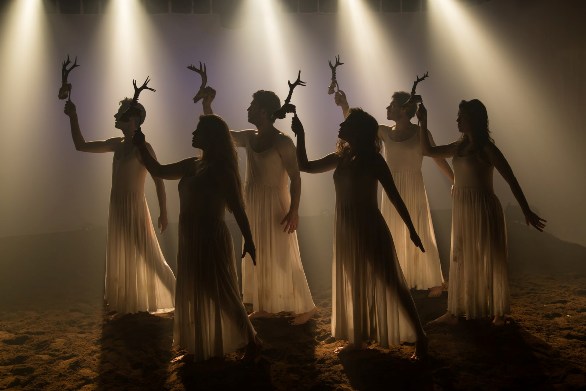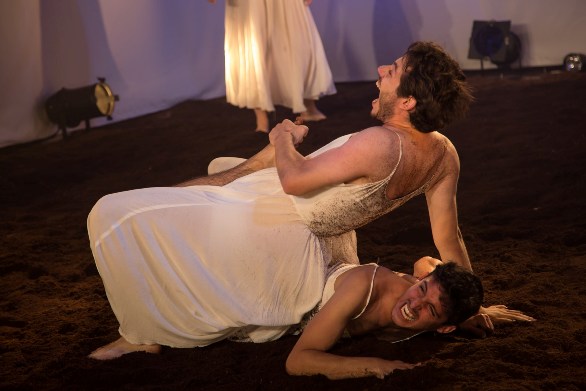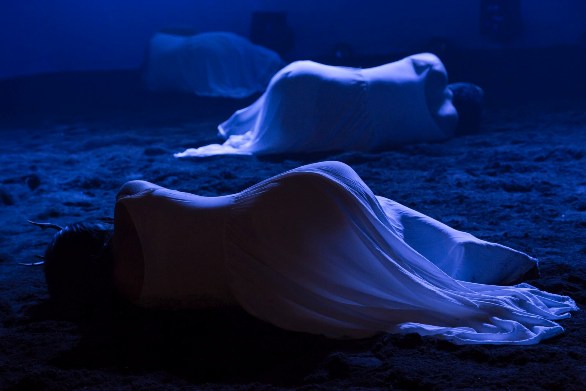
A willingness to take risks and run headlong into the unknown, this is the spirit that characterizes the poetry of Yona Wallach (1944 – 1985). Using the words of the Hebrew language in her relentless investigation of the raw material of the body and mind, she wrote poems with a savage honesty that rips through the conventions and complacency of accepted norms like a chainsaw.
When You Come to Sleep with Me is a Beer Sheva Fringe Theatre production, created by Ido Bornstein and Shlomo Plessner together with a talented creative ensemble. Taking its name from a cycle of Wallach’s poems, the play is a physical, sensual, emotional and intellectual immersion in this poetics, a narrative of the body and mind. It’s not one story, but many stories, told in word and movement, in fragments, creating a palimpsest of sensations and reflection. One might describe it as a coming of age story, told from the perspective of the body.
The play is not about Yona Wallach, yet it emerges from her sensibility and aesthetic, plunging deep into these poems to look at people and relationships. Nothing is sacred, everything can be touched, opened up to reveal all that is hidden, all that usually remains unspoken. One can piece together the stories of a girl and a boy as they grow from children to young adults, echoing the experiences of the young cast. The voices of their parents, teachers, friends and schoolyard enemies, lovers and others, are heard in encounters that shapes and alters their sense of self and the world – brutal, tender, ambiguous. And there is that inner voice, the voice of fierce urges and daring dreams, the voice that finds its expression in the poems.

The play combines original text with nine of Wallach’s poems, poetry, movement and dialogue merge together to create an experience that like the poet, may shock and jar at times, yet it is impossible to remain indifferent. In one of the poems, Tefilin, Wallach makes alternative use of tefilin, the Jewish ritual object known as phylacteries in English, in an erotic poem that may test the limits of some audiences: “turn me over on my belly / and put the tefillin in my mouth bridle reins / ride me I’m a mare.” (from the translation by Linda Stern Zisquit, from “Let the Words: Selected Poems of Yona Wallach,” Sheep Meadow Press, 2006 ). But Wallach was never afraid of confrontation, and I don’t believe that any art should pander to fear. Art (and life) is about taking risks. In the theatre, the risk is that the audience will not approve, in life it’s a bit more complicated.
The poems are sung, an interpretation very much in the spirit of Wallach, who performed her poems at readings and even toured with rockers Ilan Wirtzberg and Shimon Gelbatz. Many of her poems have been set to music, of these the provocative Sex Acher (Different Sex – from the Wirtzberg & Gelbatz album of Wallach’s songs Batzir Tov 1982) is perhaps best known. The music in the play is arranged by Kobi Vitman, who composed original music to three of the poems: Mifletzet HaAyala (the gazelle monster), Cornelia, and Shir HaAyala (the song of the gazelle).

The gazelle is a central image in the play, appearing in the opening and closing poems of the play. Performed on a floor of dirt, the audience walks into the space to find the actors already there: curled up on the ground, clad in white shroud-like garments, as if they were lying in their graves. They rise up, holding the skulls of gazelles, delicate and gruesome. The image is at once beautiful and menacing, striking a chord of ambivalence and ambiguity that is enhanced by Aya Zeiger’s costume design: male and female actors are all dressed in identical white slip dress with a full skirt, underneath are the ubiquitous tightie-whities. The lighting design by Ziv Voloshin is a strong and evocative presence as well. All these elements situate the play, from the first moments you know where you are; it is a place unlike any other, and yet so familiar. Hurtling through this dangerous territory of sex, violence, taboo and desire, the young cast convey the tectonic shifts of emotions, the tremors of discovery and explore along the fault line of constructing identity in our time and cultural clime.
When You Come to Sleep with Me will be performed at Warehouse 2 in Jaffa Port on Thursday, June 26th at 20:30, information on ticket purchase and map may be found on the event page.
When You Come to Sleep with Me
Poems: Yona Wallach; Play: Ido Borenstein; Director: Shlomo Plessner; Set and costumes: Aya Zeiger; Music: Kobi Vitman; Lighting: Ziv Voloshin; Cast: Omri Avraham, Tessa Oleartchik, Chen Baram, Itzik Mansharov, Eli Furmanov, Einav Shomrony; Asst. director: Anna Bakhan
Consult the Beer Sheva Fringe Theatre website for future performance dates and times.






Looks beautiful, sorry I missed it in Yafo. Kol hakavod to all the collaborators & cast.
Comments are closed.